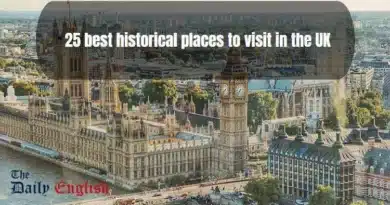UK Immigration & UK Visas – Best Answers to the Questions
UK Immigration and UK Visa
Because of its robust economy and diverse culture, the United Kingdom has traditionally been a favorite destination for immigrants. But there are complications in acquiring a UK Immigration or UK visa and emigrating to the UK, particularly for those unfamiliar.
Those who want to work and live in the UK may choose from several kinds of UK visas, each with its own needs and limitations. The Tier One Entrepreneur Visa, Tier Two Work Visa, and Tier Five Temporary Worker Visa are the three most popular visa categories.
There is a Tier One Entrepreneur Visa for people who want to start and operate a company in the UK. To qualify for this Visa, people must show that their company concept is sustainable and will generate employment in the UK. They must also have access to at least £200,000 in investment money.
Those with a job offer from a UK company who can fill skills needed in the UK workforce are eligible for the Tier Two Work Visa. People must have a legitimate employment offer, satisfy the necessary wage and skill requirements, and qualify for this Visa.
A Tier Three Temporary Worker visa is available for people who want to work briefly in the UK. This visa includes those who work in the arts and sports or participate in an authorized exchange program.
Choices for UK Immigration and UK Visa
Other choices are available for those who want to study in the UK.
Applying for a UK visa may take a long time and be expensive; costs range from £93 for a Tier Temporary Worker Visa to £1,277 for a Tier One Entrepreneur Visa. Before starting the application procedure, it is crucial to study each kind of Visa and comprehend its specifications thoroughly.
After applying for a visa, a person can work and live in the UK for as long as it is valid. After a specified time, they could be qualified to apply for citizenship or permanent residency in the UK.
Individuals prepared to put in the time and effort to go through the challenging visa procedure may find that moving to the UK is a worthwhile experience. The UK attracts immigrants from all over the globe due to its robust economy and diversified culture.
Non-Britishs need UK visas and seek to visit or work in the UK.
A. Varieties
There are several varieties of UK visas available, such as:
- Tourist visas: for short-term visits to the UK for visiting friends or family, tourism, or business purposes
- Work visas: for people who wish to work in the UK, including entrepreneurs, skilled workers, and investors
- Study visas: for people who want to study in the UK, including interns, full-time students, and researchers
- Work visas: for people who want to work in the UK, including entrepreneurs, skilled workers, and investors
- Settlement visas: for anyone wishing to remain permanently in the UK, including civil partners, spouses, and children of British nationals or permanent residents
Immigration laws and regulations in the UK may be complicated and dynamic. You must speak with an immigration lawyer or other legal expert to ensure you are following the proper steps and fulfilling the criteria for obtaining a UK visa to reside in the UK.
Frequently asked questions & their answers:
1. How can I apply for a UK visa?
Follow these procedures to apply for a visa to the UK:
- Establish the kind of visa you require: Many UK visas are available, depending on the purpose of your visit and length of stay. To find your Visa, go to the UK government website.
- Compile the necessary paperwork: Depending on the kind of Visa you’re looking for, you may need to submit different paperwork such as evidence of your financial stability, trip itinerary, passport, and an invitation letter (if applicable).
- Complete the online application form: You may submit an online application for a UK visa by completing the form on the UK government website. Complete all needed fields and attach the essential files.
- Make an appointment at a facility for visa applications: After finishing the online application, you must make an appointment at a local visa application facility. You must arrive for this appointment and carry all the necessary paperwork.
- Pay the visa application fee: You must pay the fee in person during your appointment. The fee varies depending on the sort of Visa you’re seeking.
- Await the outcome: After submitting your application, you must wait for the visa application’s outcome. Depending on the situation, this wait might take a few weeks or even months. You may call the visa application centre or check the progress of your application online.
2. What are the requirements for a UK visa?
To apply for a UK visa, you must fulfil the following conditions:
- A valid passport or other travel papers are required to enter the UK.
- You must demonstrate that you have the resources to sustain yourself financially during your visit to the UK.
- It would help if you had a valid purpose for travelling to the UK, such as business, travel, or education.
- You cannot be a danger to national security or have any prior criminal convictions.
- You need to be in excellent health and free of any infectious disorders.
- You could be asked to provide evidence of your links to your native country, such as employment or a piece of real estate.
- Your evidence of lodging and a return or onward ticket may be requested.
- The cost of ordering a visa can be applied.
3. How long does it take to process a UK visa application?
The kind of visa being sought, the nation from which the application is submitted, and the number of applications filed at the time of application may affect how quickly a UK visa application is processed.
Standard processing timeframes for UK visa requests are generally as follows:
- Super Priority Visa: 1 working day
- Priority Visa: 5 working days
- Legal Visa: 3 weeks
It is important to remember that these processing dates are not promises and may vary based on the particulars of the application. Because of many applications, processing times sometimes take longer because more checks are needed. In general, giving yourself plenty of time to get your Visa before any intended journey to the UK is preferable.
4. Can I work in the UK on a tourist visa?
No, a tourist visa does not allow you to work in the UK. You must have a valid work visa or permit to be employed in the UK. If you wish to work in the UK, you must apply for the appropriate Visa or qualify through the UK Visas and Immigration website.
5. How can I extend my UK visa?
To extend your UK visa, you will need to follow the steps below:
- Check if you are eligible to extend your Visa: You can only extend your Visa if you are already in the UK and if your Visa is still valid.
- Gather all necessary documents: Provide proof of your identity, your current immigration status, and your reason for wanting to extend your stay in the UK. This may include documents such as your passport, proof of financial support, and any relevant supporting evidence.
- Submit your application: You can either submit your application online or by post. Check the deadline for submitting your application and pay the required fee.
- Please wait for a decision. Your application can be processed in several weeks. You will receive a decision letter in the mail or via email depending on how you submit it.
- If your application is approved, you will receive a new visa, allowing you to stay longer in the UK.
- If your application is denied: If your application is rejected, you have the right to appeal the decision. You can do this by writing to the Home Office explaining why you think the decision was wrong and providing any additional supporting evidence.
6. Can I bring my family with me to the UK on a work visa?
You are allowed to bring your family to the UK on a work visa. Your family should apply for a dependant visa to work and live in the UK while employed. They must provide evidence of their relationships to you, such as marriage or birth certificates, and meet the necessary immigration requirements. You should check with the UK visa office for specific needs and the application process for dependent visas.
7. Can I study in the UK on a visitor visa?
No, a visitor visa is not meant to study in the UK. To study in the UK, one may need to apply for a student visa through the UK Visa and Immigration (UKVI) department. This Visa allows you to study in the UK for a specific period, usually for the duration of your course. You must also show evidence of your acceptance into a recognized educational institution, financial support for your studies, and other relevant documents.
8. Can I apply for permanent residency in the UK?
You must meet the following obligations to apply for permanent residence in the UK:
- Been continuously residing in the United Kingdom for at least five years.
- Be practising your Treaty Rights as a worker, independent contractor, student, or member of your family who is self-sufficient.
- Pass the “habitual residency” requirement, which calls for you to legally reside in the UK.
- Have lived in the same place for five years without taking any more than six-month vacations from the UK.
- Fulfil the criteria for knowledge of the UK language and lifestyle.
- Comply with the eligibility criteria.
You may apply for perpetual residence in the UK if you fulfil these requirements. However, it is important to note that applying for permanent residency may be complicated; thus, it is advised to consult an immigration lawyer or other skilled immigration counsel.
9. What is the UK’s Points-Based System for immigration?
The UK’s Points-Based System (PBS) is a system for managing immigration and deciding who can come to the UK to work, live, and study. It is divided into five tiers:
- Tier 1: This is for highly skilled individuals, such as entrepreneurs, investors, and skilled workers, with a job offer.
- Tier 2: This is for skilled workers with a job offer in the UK.
- Tier 3: This is for low-skilled workers and has not been used.
- Tier 4 is for students accepted onto a UK university or college course.
- Tier 5 is for temporary workers and youth mobility schemes, such as the Working Holiday Visa.
To apply for a visa under the PBS, individuals must meet specific requirements and score certain points based on age, qualifications, skills, and English language proficiency.
10. How do I know if I am eligible for a UK visa?
To determine if you are eligible for a UK visa, you will need to consider the following factors:
- The purpose of your visit: You will need a specific reason for visiting the UK, such as tourism, business, study, or work.
- Your nationality: Different countries have different visa requirements for UK entry. You can check the UK government’s website to see if you need a visa based on your nationality.
- Your length of stay: If you are visiting the UK for less than six months, you may be eligible for a short-term or long-term visa if you stay longer.
- Your finances: You must demonstrate that you have enough funds to cover your stay in the UK, including accommodation and living expenses.
- Your employment status: If you plan to work or study in the UK, you must provide proof of your employment or enrollment in a UK institution.
You should check the UK government’s website for the most up-to-date visa requirements and eligibility information. You can also consult with the UK embassy or consulate in your country for further assistance.









Comments are closed.